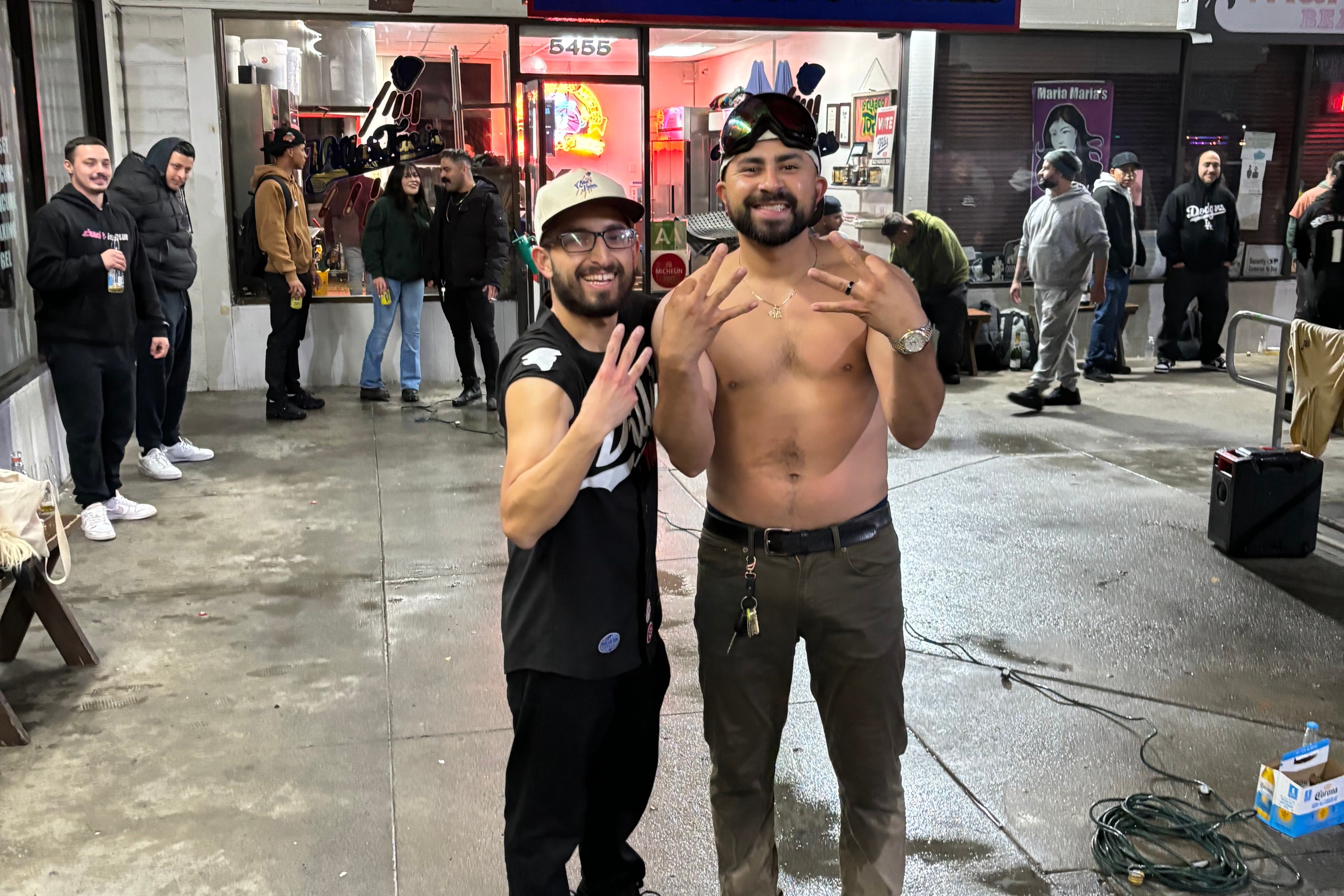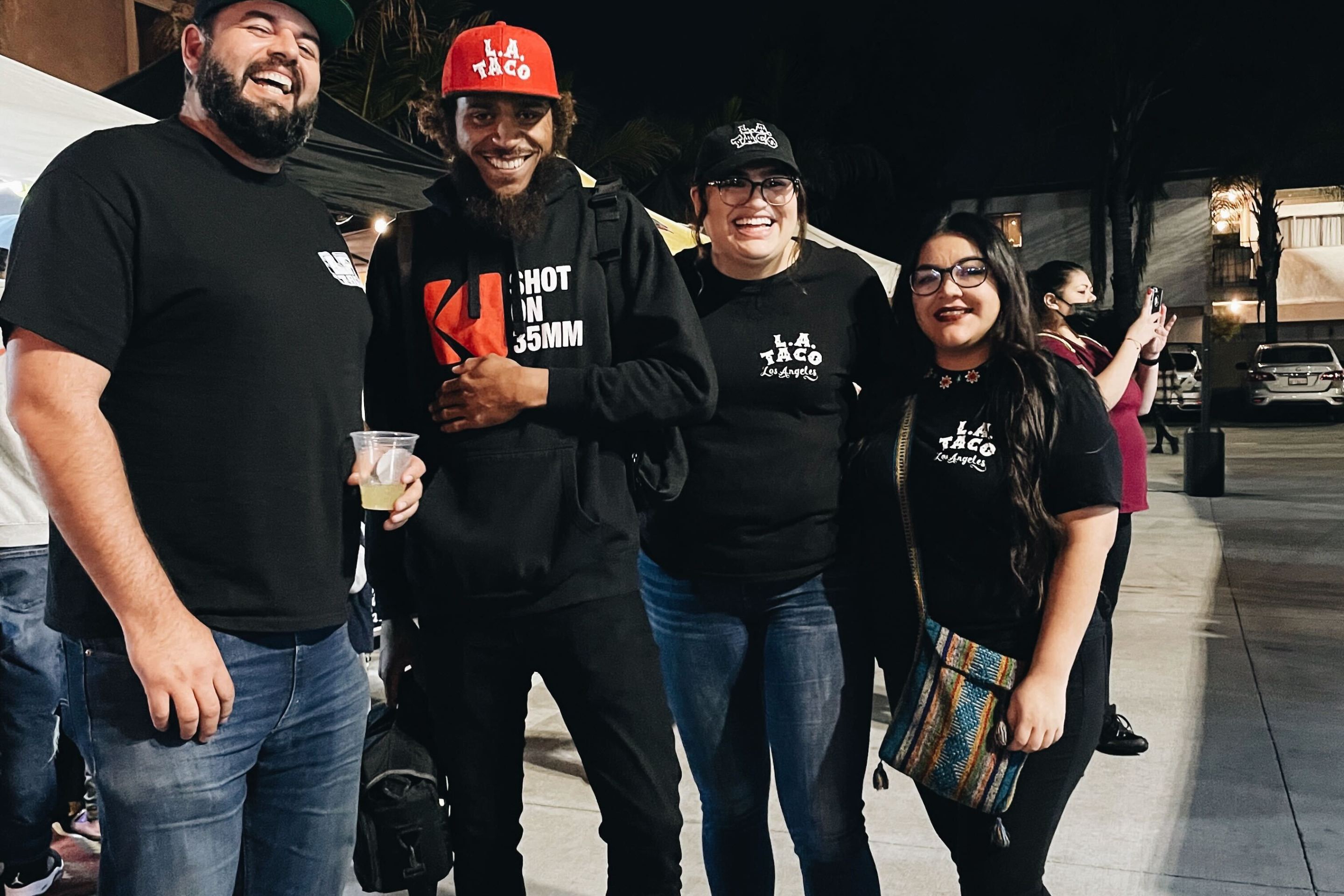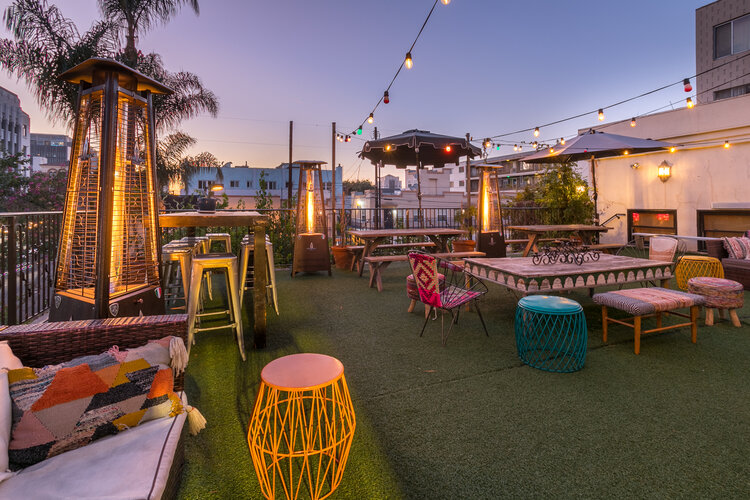Queer Latin Dance Classes Hidden in a Highland Park Garage Are Shaking Up Gender Roles
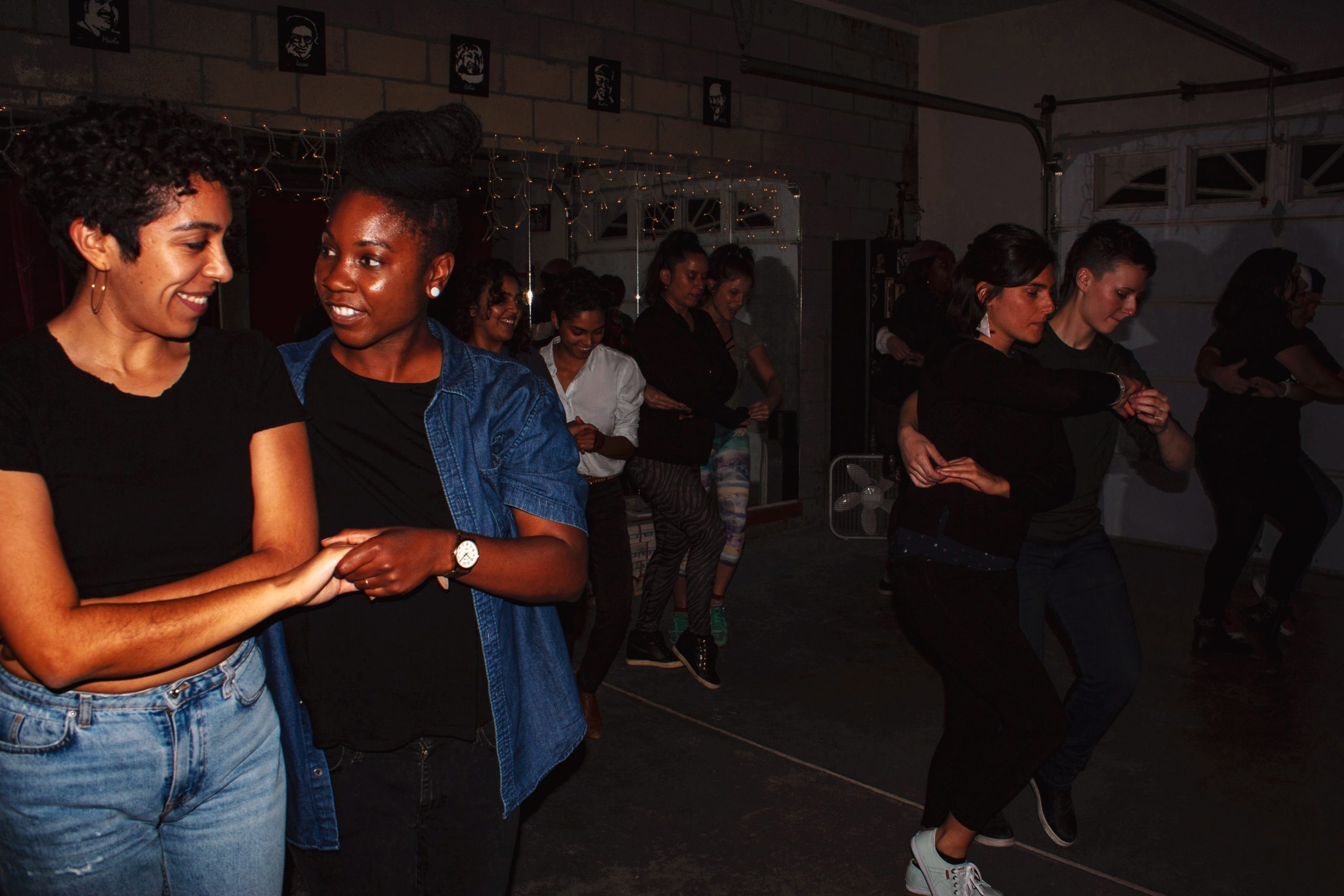
[dropcap size=big]T[/dropcap]wo months ago, I visited my fellow queer Latina friend in San Francisco and she deflowered me from club dancing.
The first club we went to was straight and it was a cumbia night. After 11 years of friendship, I never knew she could dance—and especially lead, like, where does a queer girl learn that? We had a lot of fun dancing together. Hence my addiction to Latin dancing began. But of course, as many womxn and queer people have experienced, a man offered to dance with me and decided it’d be cool to sexually harass me as well.
We got him kicked out but still felt uncomfortable there, so we left to a gay bar and felt safe, liberated and free.
Upon returning to Los Angeles, all I wanted was to combine these two new loves I had—Latin dancing and a safe, queer community. I began googling “queer Latin dance nights” at different clubs and LGBTQ+ parties but found nothing. Randomly, I came upon @queertrans_events Instagram who reposted Queer Latin Dance LA’s flyer for their salsa and bachata classes in Highland Park.
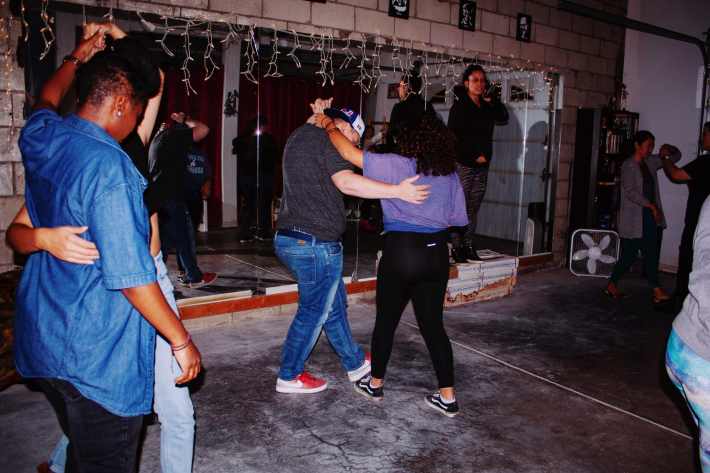
“I want people to feel that when they come to the studio or to my class that they’re coming to my house. And they do, right?” laughed Arlene Santos, one of the instructors and co-founders of Queer Latin Dance LA who uses her garage for the classes.
Queer Latin Dance LA is a weekly salsa and bachata class from 7:30 PM. to 9 PM on Tuesdays, dance socials the first Saturday of each month, and a dance team. To our knowledge, they are the only existing queer Latin dance community in L.A. Founded and taught by Arlene Santos and Karin Gut, they strive to make Latin dancing accessible to queer people, and provide an equitable, safe, community space. Though Santos herself is straight, about four years ago, Karin Gut asked if she could lead a class for her LGBTQ+ meetups and she excitedly agreed. They met because Gut’s girlfriend at the time wanted to learn partner dancing and ended up in Santo’s class and Pasadena studio, Lumina Dance Academy. From at first having “two left feet and three left hands,” Gut soon was teaching alongside Santos for the queer community.
“There are also men who think, ‘Well I’m a macho man, I’m the leader of this dance,’ and ‘a woman? What are you trying to do here? Be a man? I’ll show you how to lead.’”
“It’s important to me because I want to create a safe, welcoming space for everybody in the LGBTQ community to come learn how to dance, be comfortable, be themselves, not being looked at funny,” said Gut, the other instructor and co-founder of Queer Latin Dance LA.
Starting Off with Two Left Feet
Gut’s own experience with dancing prior to meeting Santos was bad. Whether it was at a lesbian bar or straight bar, women assumed she was hitting on them and would reject or skip her in partner rotation. Specifically, at straight bars, many women were too uncomfortable to dance with another woman, which led her to ask them to dance with her head down to “just get this over with” and to avoid drawing attention.
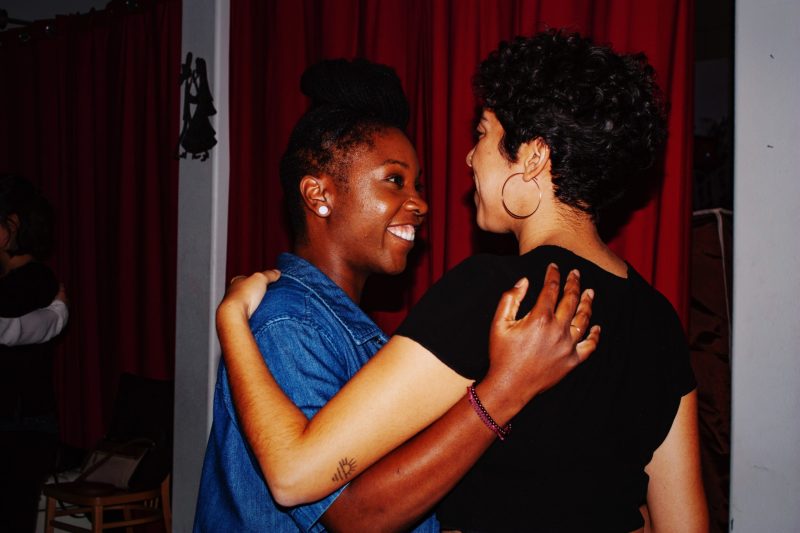
“There are also men who think, ‘Well I’m a macho man, I’m the leader of this dance,’ and ‘a woman? What are you trying to do here? Be a man? I’ll show you how to lead.’”
Realizing that if she wanted a safe space to dance, she’d have to create it. So about five years ago, Gut and Santos offered their first LGBTQ+ dance classes at the Oxwood Inn, a lesbian dive bar in Van Nuys that closed down almost two years ago. Once it closed, they moved to whatever space they could find, and are now located in Santos’ garage until they find another place. Named Queer Latin Dance LA only a year and a half ago, currently Santos teaches salsa, then a break, then Gut teaches bachata.
For my first class, I was nervous to go to someone’s house I didn’t know, so I brought a friend. Almost the entire class, we laughed at how terrible we were at dancing, but unlike in ballet classes, laughing wasn’t received with scolds or glares, it was welcomed.
For my first class, I was nervous to go to someone’s house I didn’t know, so I brought a friend. Almost the entire class, we laughed at how terrible we were at dancing, but unlike in ballet classes, laughing wasn’t received with scolds or glares, it was welcomed.
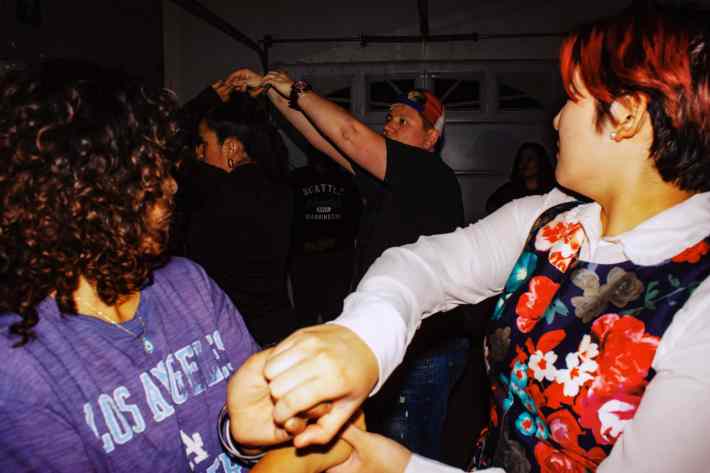
I took ballet classes for 14 years and was in their dance company too. Similar to a high school environment where teachers are very authoritative, most of the ballet teachers I had were strict, stern, and made kids cry. It was commonplace for instructors to use a ruler to check if you’re squeezing your butt enough, and to press their foot into yours to force the turnout of your feet.
Compared to Latin dancing, there’s not a lot of partner dancing in ballet unless it’s for a production, but even then it’s usually only if you’re dancing with a man. Also, ballet is very rigid and focuses on creating perfect lines with the body, so hip movements, body rolls, or ribcage circles found in Latin dancing just doesn’t exist. Tights, a leotard, and a tight bun leave no room for choices in physical appearance that aren’t gendered and feels uncomfortably exposed. High stress, high pressure, it’s absolutely nothing like the Queer Latin Dance LA classes I took.
“When you’re dealing with something that has ingrained gender roles, you need a space that is open and accepting and playful in order to figure out how those gender roles can be rearranged and reclaimed...”
Having loved the class, we returned and I went to one of their socials too. During socials, people ask you to dance for one song, thank you, and move on. Versus in classes, everyone rotates partners—the option to stick with one partner is there too. We danced with all different ages, some professional and others who just started. Their students expressed mutual positive experiences including it being accessible to the queer community, being welcoming to beginners, and feeling safer in a dance environment.
“When you’re dealing with something that has ingrained gender roles, you need a space that is open and accepting and playful in order to figure out how those gender roles can be rearranged and reclaimed...” said Zenzele Price.
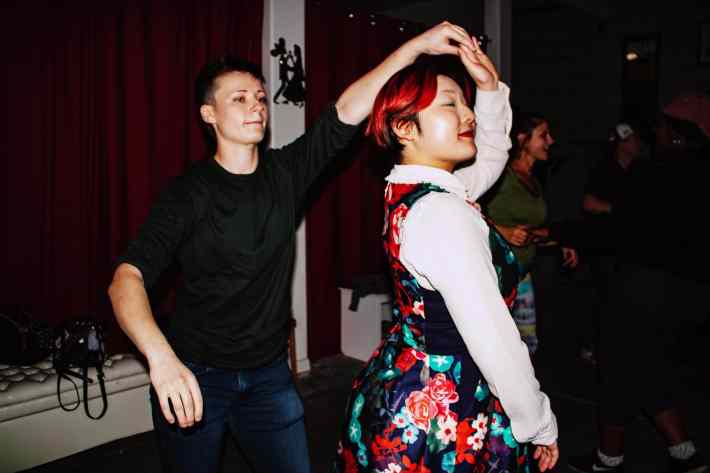
Santos explained that in a typical Latin dance class, the instructor will ask that ladies to go to one side, and gentlemen on the other side. Ever since she started these classes for the queer community, she changed how she teaches all her classes—queer or not—to “lead on one side, and follows on the other.”
“As society is adapting, things like that are becoming more and more normalized. Queer people need to learn how to dance together too!” said Price
Gender Roles In Dancing, Rearranged and Reclaimed
We really do. Going into a dance class having no dance experience can be scary, but Queer Latin Dance LA makes sure this initial fear is not a problem. Some of the students mentioned they had no previous dance experience and were nervous and scared to go at all. Bailey Albinger expressed that to her surprise, “It was very open and slow-moving.”
Similarly, Gina Cho said, “I feel comfortable because it’s for people of all...they can be beginners, they can have no experience dancing, and there’s no judgment if we have trouble picking up a step, and everyone is really nice and friendly.”
“A lead and a follow should be something where you’re equal. That’s why I like being in this space because I feel like I’m equal with whoever I’m dancing with, and standing outside of that patriarchy and domination.”
Though not all straight clubs are bad, many contain dangerous toxicity such as sexual assault and harassment, violence, and an unwelcoming environment for LGBTQ+. Exemplified in my own recent encounter, women and LGBTQ+ people are all too familiar with sexual assault and violence in the Latin dance club scene. Only a little over three years ago was the Orlando shooting at Pulse’s Latin nights. Their students expressed various stories of having “less agency,” said Price, being sexually harassed, said Cho, and an inability to relax because they are always on guard, said both Michelle Rodriguez and Hannah Woods.
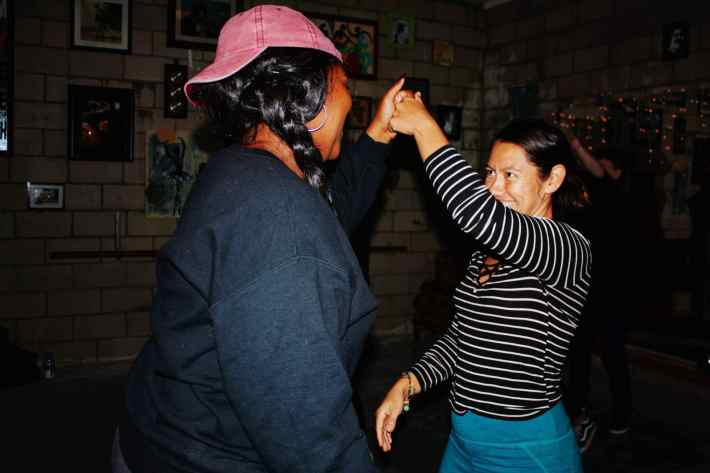
“A lead and a follow should be something where you’re equal. That’s why I like being in this space because I feel like I’m equal with whoever I’m dancing with, and standing outside of that patriarchy and domination,” said Rodriguez.
As Gut related, other toxic issues LGBTQ+ face at straight clubs are not being asked to dance or being rejected. Oftentimes when people see Santos and Gut dancing together, she doesn’t get asked to dance for the rest of the night.
What Is the Difference Between Straight Dance Festivals and Queer Ones?
“Everybody should be able to learn to dance and feel comfortable,” said Santos.
Contrary to what I expected, most of the people that take classes are not Latinx (by the problematic U.S. census definition of “Latino”). I assumed the opposite because it would relate to their identity in a way that they can fearlessly be themselves and feel a sense of belonging within Latinidad, something that my friends and I are always seeking. One of their few Latinx students, Rodriguez, was tired of not being able to dance with her family, and finds the classes to be a way to connect more to her culture. Santos dreams of their dance team performing at the World Salsa Fest to raise awareness specifically to the Latin queer dance community that they exist and have a space for them.
Their team has performed at Outfest, a Latino fashion show, at LA Pride, the Calavera event at Mi Centro, and the Queer Latin Dance Festival in Oakland—the only festival of it’s kind. The Queer Latin Dance Festival shows that LGBTQ+ Latin dance spaces are needed everywhere and that Queer Latin Dance LA aren’t alone in their mission. The two-day festival draws queer dance companies all over the US, Mexico, Canada and more, and offers workshops, classes, socials, and performances.
“That’s the most fun one I’ve ever been to and I’ve been going to festivals for 20 years,” said Santos.
According to Santos and Gut, the difference at the Queer Latin Dance Festival compared to straight ones was the absence of toxic competitiveness, and the presence of community building and acceptance - everyone was good enough to dance with anyone. This is the same philosophy that they create in their own Queer Latin Dance LA classes.
Whether you’re shy or outgoing, no experience or experienced at dancing, Queer Latin Dance LA is a place for you to find liberation, safety, and the LGBTQ+ community.
Stay in touch
Sign up for our free newsletter
More from L.A. TACO
Announcing the TACO MADNESS 2024 Winner: Our First Ever Three-Time-Champion From Highland Park
Stay tuned for the new date of our TACO MADNESS festival, which was unfortunately postponed this last Saturday due to rain.
What To Eat This Weekend: Cannabis-Infused Boat Noodles, Thai Smashburgers, and “Grass & Ass”
Plus, a pizza festival and a respected chef from Toluca, Mexico comes to Pasadena to consult for a restaurant menu, including enchiladas divorciadas, and more.
Facing ‘Immediate Layoffs,’ L.A. TACO Launches Membership Drive to Save Our Publication
After Sunday, we do not have enough money to make another payroll. We need 5,000 members to become sustainable. Our deadline is April 26th to hit this goal.
This New Koreatown Onigiri Spot Is Unlike Any Other in Southern California
Supamu, which started as a food truck and a series of pop-ups, brands itself as Southern California’s first Okinawa-style onigiri. What sets its onigiri apart from competitors? All the details are in the post, plus where to find it.
When ‘Tomorrow’ Never Comes: The Saga of a DTLA Bar Staff’s Struggle To Get Paid
A barback recalled a time when he had to use a payday loan app to cover a dinner bill. “How can you, with a straight face, hand someone a check knowing that there isn’t money in the account,” the barback questioned.
